Spartacus: Series 1-3 Reaction Post
I don't think I've ever tried making one reaction post for an entire TV-series, but this is something I need to get out of my system. I wasn't even going to watch it, for heaven's sake! I'm not one for gore and epic bloodshed (though I am one for canon gay, yes), but this show - this goddamn show! It can be SO bad but it can be SO awesome. So, basically, it's a love/hate thing I've got going here. Let me share my feels.
Warning: Spoilers for Series 1-3 including the series finale; some tw and nsfw gifs.
1. Basically the whole show is this:
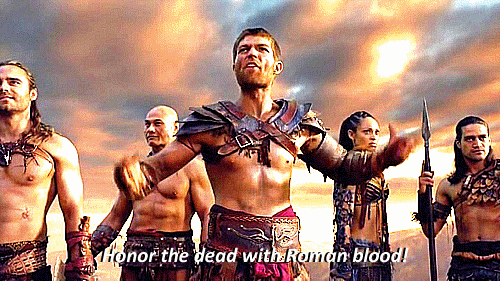
No, but seriously, that's it. That's the show. Everyone is very single-minded here, regardless of which side you're dealing with. Everyone would like nothing better than "to feel enemy blood hot upon face". It's legit their biggest turn-on, so if pools of blood are not your thing... I can't say it's my thing either, but well. XD
Violence in Spartacus probably deserves a thesis dedicated to it. It's a thing, it's the thing. There are no lengths the show won't go to, and the best part is that it's hard to figure out whether it's serious or not. Maybe it's just me who can't take dramatic cut-off heads flying around in slo-mo seriously. By the way, slow motion is also a very big thing. If there is a gladiator fight, it'll be in slo-mo. A big battle - slo-mo. Sex - 50 % slo-mo. Hitting someone in the face with jug of wine? You guessed right: slo-mo! Everything is slo-mo complete with showers of blood, dramatic movements and epic (and I do mean EPIC) music with menacing choirs and chants. Sometimes it's scary; most of the time it's funny. Occasionally it's sad.

By series 3, the favourite way to kill someone (aside from cutting off the head) is to shove the sword in their mouth. Speaking of "killability": the Romans are total Redshirts; they are expendable like you wouldn't believe, their armour is made of paper (or the rebels all come from Krypton, you never know what's out there east of the Rhine or around the Nile...) and even their own commanders gladly kill them off if they so much as don't like the look on their faces. I honestly have no idea how Rome survived and how they managed to actually win the Third Servile War. Then again, no need to think about Spartacus as a historical TV-series. If you read about the real Spartacus, things are a lot more boring there and I'm pretty sure that while the amount of blood spilt was roughly the same, it didn't do epic somersaults in the air.
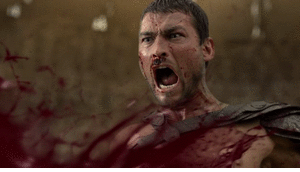
(c)
That is not to say the rebels don't die. One thing you might want to remember before watching this show: everyone dies. And I do mean everyone. By the finale, there are six arguably main characters remaining alive (two of them more or less protected by the fact that they were real people) out of a very large cast. Basically, Spartacus is the series where it's difficult to genuinely like someone (because everyone is a dick one way or the other) but as soon as you do, they die. It doesn't matter that they may have survived all 3 (4 if you count the mini-prequel) series; they will still die five minutes before the end of the show.
2. Death in Spartacus is a very multi-faceted thing. Sometimes it's dramatic and meaningful; at other times it's stupid and pointless. Sometimes it makes you feel sad; at other times triumphant. Sometimes it's a totally predictable outcome; at others it comes unexpectedly.
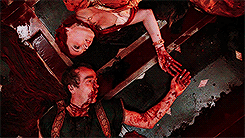
(c) vertigos
Given that everyone dies, I don't think it's that much of a surprise that Spartacus himself does too. By this time I'd already had tears in my eyes, but throughout the scene my handkerchief became absolutely soaked through. Kudos to Liam McIntyre for doing a great job.
Spartacus' death is foreshadowed from the very first episode and then again, many times. His late wife Sura states that he is destined for "great and unfortunate things"; she also predicts that he will bow before "the red serpent". During the final battle, Spartacus recalls this prophecy when he see the red serpent on the shield of his friend Agron; the shield would come to serve as his gravestone.
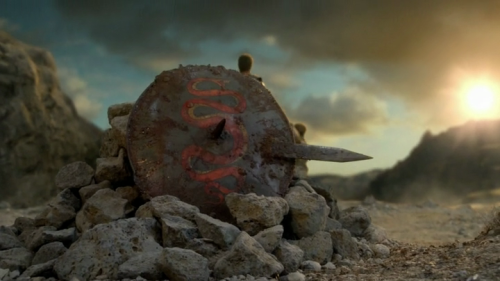
The beauty of Spartacus' death is that he doesn't seem to want it despite everything he's lost, but he's resigned to it. Throughout the series, Spartacus evolves from the man blinded by his thirst for vengeance for the dead to the man willing to defend those who are still alive (the point Crixus can't seem to move past), as evidenced by his "They are all Sura" statement. Interestingly, most historians don't explicitly focus on the anti-slavery goals of the Spartacus rebelion, which means he might have been focused on something else. Spartacus represented in the series is an ideal, a freedom-fighter, the iconic image. Which is why his death scene, while sad, is so damn perfect.
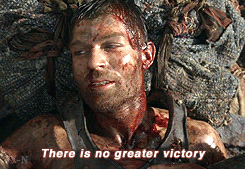
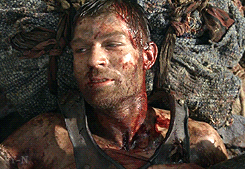
(c)
The final battle against the Roman legions sees the split of Spartacus' people (historically, about 70,000 people!): the soldiers march to war, while the more "peaceful" populace attempts to reach safety beyond the mountains. The army is defeated by Marcus Crassus; it is later revealed that most of the second half has also been killed, ambushed by the other Roman commander. Spartacus' rebelion was doomed to fail; we know it failed IRL. And yet, ideologically, from the point of view of this Spartacus, his death was the one he could only have hoped for. He died in battle but he didn't die with the enemy watching him. He was surrounded by friends, he knew that at least some of his people were safe, and he died on his own terms. Again, as history tells us, his body was never found, which means the enemy never reached it, never got to parade it around, celebrating victory. True, Spartacus is dead and the rebelion is crushed, but Agron's words do come true:
One day, Rome will crumble and fall. But your name will be remembered forever.

I've noticed that some reaction posts authors are displeased that Spartacus was killed by some random Romans and not by Crassus. The way I see it, it's also a part of his victory. If Crassus had defeated him, it would have been his victory. As such, it's just an unfortunate occurrence, the victor snatched from Crassus in the last moment, both by the random Romans and by Agron who pushes Crassus away and doesn't let him deliver the final blow. It's yet another proof of Spartacus' freedom: death comes unseen, barely registered and he accepts it calmly.
3. Well, enough waxing poetic for now. XD Let's talk about the language for now! OMG the language in this show! Basically, it deserves a How To manual.
Spartacus: how to forget the use of English articles after one episode. No but really. Nobody uses articles, unless they talk about the Gods.
Spartacus: how to speak loftily if you suffer from Tourette's. Everyone is doing that. On the one hand, we have these lofty turns of phrase every five seconds, such as:
- I will have words.
- Fall from sight.
- You stand absent choice/reason/etc.
- You/I/We/etc. are yet of this world.
- He/she/etc. yet lives.
- I will not be from your side;
etc.
On the other hand, gems like this: "I will not! NOT be FUCKED, you FUCK you fucking cock-sucking, you haemorrhoid-sucking FUCK, YOU FUCK!" And don't get me started on the constant mentions of "piss and shit", creative expletives like "Jupiter's cock!" and general affinity for mentioning both male and female anatomy. As for the f-word, it's by no means a taboo and the use of it can rival Debra Morgan's love for this word.
There is also a number of token words and phrases that crop up in almost every episode. "Kill them all" is a motto of both sides and is repeated so often (especially in the first season) that I'm beginning to think they're all Metallica fans there; season 2 is titled Vengeance so naturally that's what everyone's objective is (same as "blood and sand" are constantly mentioned in the eponymous first season).
4. Characters are naturally also a very important thing. Like I said before, there are no nice characters here. Betrayal and backstabbing is upped to the max and if - God(s) forbid! - someone does something nice, they must promptly rectifying it by doing something evil (notable example: Crassus tearfully forgiving Kore for the murder of his son - only for her to be shown crucified a few scenes later).
The rebels are only marginally better than the Romans. Both sides have a pretty black-and-white morality: they are good, their opponent is bad. Hence a lot of cruelty on both sides. But even though hardly anyone is deserving of sympathy, at least everyone is complex, layered and has a distinctive personality. And the best part? There is no difference between men and women. Both sexes can be crudely objectified (naked female slaves abound in 99 % of domestic scenes depicting the Roman household, but the entire season 1 is basically about rich Roman ladies panting after mostly naked gladiators; full frontal nudity also features both sexes); and both sexes can be empowered. The rebel army has some really badass female fighters (Saxa, Naevia, Mira) and the men don't really raise an eyebrow at that. Even when Tiberius (a young Roman commander) is slated to be executed by Naevia, the first thing he points out is that she is a slave; he doesn't seem to be surprised by her being a woman. Kudos for equality.
Diversity is generally the show's strong suit. We get different deaths; different ships; different dynamics; different personality types; different motives. The horrific idea of being good people who "do terrible things because we must" goes side by side with complete lack of conscience; noble aspirations contrast with extreme self-preservation; mistakes are never forgiven and offence is never forgotten. This is a show about a bunch of people who really can hold a grudge. It makes everyone in Game of Thrones look like cute, harmless kittens. Which is why it can actually be hard to watch. The absence of light is seriously depressing, and let's not forget that daily entertainment for these people was hardly different from war, so there's blood and gore regardless of what the scene is about: a battle or a relaxing party. Also, the issue of consent was pretty much non-existent, so there's a lot of non-con.
5. Which brings us to the sex scenes. There's a lot of them. Like, if you think there are many sex scenes in Game of Thrones, you are Jon Snow and know nothing. Spartacus presents a number of het ships (discountingvarious orgies or visits to a brothel), two slash ships and one tiny femslash ship. Most of them have sex. Fade-out is used very seldom; most likely, if they got down to it, they'll see it through to the end. Some of it is redundant, some of it is ridiculous (Gannicus undressing Sibyl during their scene in the snow f.ex.; because clearly people can't have sex unless they see boobs; sex in clothes doesn't exist), and some is filmed beautifully (f.ex. all of Crassus/Kore scenes, some of Crixus/Naevia, Spartacus/Illithyia masked scene is a masterpiece and of course the gorgeous Agron/Nasir scene in 3x03).

(c) procrastinator13
6. Speaking of chemistry. Everyone has it. It's not even the shippy chemistry per se; it's the type of chemistry where you're just so happy some characters share a scene. Spartacus and Crassus have awesome Foe Yay, though they barely share any screen time at all; Spartacus and Batiatus in season 1 have a complicated relationship; Spartacus and his three BFFs (Agron, Crixus, and Gannicus) are just a pleasure to watch; Onomaeus is the local Obi-Wan to everyone; Crixus and Naevia's awesome fighting duo; the cuteness of Nasir and Agron; the charming Castus flirting with Nasir; Spartacus and Laeta and their tentative relationship; the tragic, touching story of Crassus and his slave Kore; and let's not forget these two Roman snakes who are friends but snog happily once in a while:

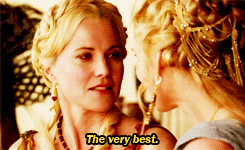
(c) shallwebegiin
Imho, one of the craziest example of unexpected chemistry is between Spartacus and Illithyia. She is the wife of his greatest enemy, the man because of whom he was sold into slavery and lost the love of his life. In the very beginning of their relationship Sura foretells that Spartacus will never love another woman; he later admits the prediction has come true. The loss of Sura has been his greatest motivation throughout the series, and the hate he harbours for Glaber is naturally transferred onto his wife (who is quite the bitch herself; she saw to the death of Spartacus' only friend in season 1 though I don't think he was aware of that). As soon as he finds out they have both been tricked into a sexual encounter, he does make an attempt to kill Illithyia and most likely regrets its failure. And yet, he seems to have cooled off a bit by the time they meet again in season 2 (probably because he doesn't have to see her that often now). The chemistry between them is amazing for something so tentative and unidentified. It's not romantic or sexual; it's not Foe Yay per se, but these two have something to say to each other and they say it in 2x08 when Illithyia is delivered to Spartacus so he could take revenge on her husband by depriving him of his wife like Glaber had deprived him of Sura. That plan fails so spectacularly.
Illithyia is a manipulative bitch. Spartacus is noble but holds a grudge like anyone in this show. MFEO, if you ask me; at least on this occasion. Sometimes her words reach him, sometimes they don't, but that fragile something is there. For someone so proud, Illithyia sure knows how to beg. And let's not forget she's actually very pregnant atm, which does not guarantee her safety, like, at all because this show gleefully averts the Infant Immortality trope at every turn. But that's not why her condition matters. I did mention she slept with Spartacus, didn't I? ;)


(c)
The good thing about Spartacus is that he's actually a good tactician. He comes to realize that Illithyia holds more value alive than she does dead, so he plans to trade her for weapons that his army needs. Too bad her husband doesn't really go with the plan, which brings us to two epic moments: Spartacus indirectly hinting that the kid is not Glaber's (haha, the irony that poor Glaber will never get; which doesn't matter in the long run because everyone will die anyway) and this:




(c)
"He does not love you as I loved my wife."
Illithyia is amazed that Spartacus is leaving her alive. He warns her not to think of it as kindness. It is relevant on several levels: to begin with, leaving a pregnant woman alone in the woods is definitely not a kindness; besides, she's bound to face the consequences of both Glaber's actions and hers. It is a monstrous tangle (I can't really blame Spartacus for not wanting to deal with any of it): her actions pushed Glaber from being a good okay-ish man who did what he must to being a monster; he in turn pushed her closer to that edge. To kill Illithyia then would have actually been more merciful considering how she died later; too bad we can't know Spartacus' reaction to the news of her death (if he ever did find out).
7. Symbolism is also strong in this show. Sometimes it's subtle, sometimes less so. Personally I am particularly partial to the recurring blond woman with a newborn baby in series 3. She gives birth towards the end of season 3 (aided by Kore, which is symbolic all by itself, since Kore is not a "true believer" in Spartacus' cause; she's just there because reasons) and is later seen feeding the baby, observed by Crixus and Naevia. Afterwards, she leaves with the "peaceful" part of Spartacus' men, thanking Spartacus for everything he's done for the slaves; she is later seen when he is dying, which means she survived the attack. In the show where not even babies are safe, it is incredible. The woman is a very powerful, yet subtle symbol. She doesn't play that big a part but she somehow crops up in all the important scenes. Despite reaffirming for the thousandth time her thirst for Roman blood, Naevia watches her with clear envy; for her, the dream of domestic bliss is only a distant prospect (never to come true because this show is clearly written by people who kill puppies for fun; I suspect it's written by Romans). The fact that the woman and her baby survive the final attack screams symbolism as well. She is free, her child was born free, Spartacus is dying free. Freedom is the most thing in this show in the long run, and at least some people have it.
8. Nasir and Agron. I can't not talk about them because OTP! They are cute, they love each other, they're badass fighters, and most surprisingly, they survive.
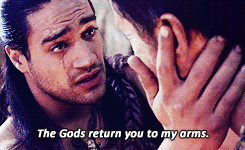
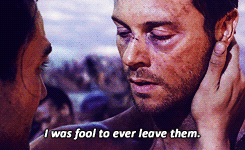
(c) fuckyeahpanahemataylor
You don't usually swing swords around gay people; they're bound to get pierced by them. It's basically a law (and very definitely a trope) that gay people die a lot in fiction. And yet, Agron and Nasir are the only couple to survive this meat-grinder of a show. They don't have nearly as much screentime as I would have wanted them to, but then again, it just means they're not in every second of the show. XD
Spartacus is not always extremely captivating. I marathoned it within, perhaps, a week or so, but that's mostly because I wanted to finish it ASAP so that it stopped eating up my time and brains. And yet, given all its faults, it often does the best job it can to develop minor characters and to elevate them from the one-dimensional background position. Just as Naevia is not just a poor victim of tragic circumstances, Nasir isn't helpless and Agron isn't a dumb jock type. Together they make a couple of compelling characters who are defined not only by their (admittedly charming) love story, but also by their actions and relationships with other characters (Nasir rising above his slave mentality to become a great warrior and aiding in saving Naevia; Agron being Spartacus' loyal friend and ally). It is a matter of opinion who deserved to be the last man standing, but in some cases fate had already been shaped by history, so it's no use complaining.
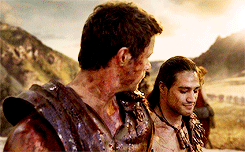

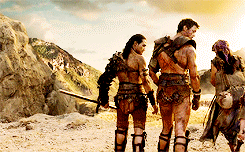
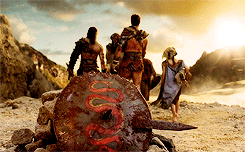
(c) pelennors
Like any show, Spartacus has good and bad moments. Quite a lot of action scenes are overly dramatic and laughable (slo-mo combined with dramatic turns, flying heads, fountains of blood and epic outcries f.ex.). Profanity is overused, but something tells me that's about how they would have talked IRL. And yet, Spartacus will ambush you with unexpected feels, surprise you with dealing out an equal share of misery and badassery, and make you laugh and go 'awww!' quite a few times. Underneath all the layers, the message is simple: freedom is the most important thing.
As a bonus, it will stab you in the feels by showing all of the characters in the final credits and wrapping up with a reminder of the real-life sad story related to the show: Spartacus was recast after season 1 because Andy Whitfield who played him then died of cancer. The final image of the show is Andy doing the iconic "I am Spartacus!" outcry.
Warning: Spoilers for Series 1-3 including the series finale; some tw and nsfw gifs.
1. Basically the whole show is this:

No, but seriously, that's it. That's the show. Everyone is very single-minded here, regardless of which side you're dealing with. Everyone would like nothing better than "to feel enemy blood hot upon face". It's legit their biggest turn-on, so if pools of blood are not your thing... I can't say it's my thing either, but well. XD
Violence in Spartacus probably deserves a thesis dedicated to it. It's a thing, it's the thing. There are no lengths the show won't go to, and the best part is that it's hard to figure out whether it's serious or not. Maybe it's just me who can't take dramatic cut-off heads flying around in slo-mo seriously. By the way, slow motion is also a very big thing. If there is a gladiator fight, it'll be in slo-mo. A big battle - slo-mo. Sex - 50 % slo-mo. Hitting someone in the face with jug of wine? You guessed right: slo-mo! Everything is slo-mo complete with showers of blood, dramatic movements and epic (and I do mean EPIC) music with menacing choirs and chants. Sometimes it's scary; most of the time it's funny. Occasionally it's sad.

By series 3, the favourite way to kill someone (aside from cutting off the head) is to shove the sword in their mouth. Speaking of "killability": the Romans are total Redshirts; they are expendable like you wouldn't believe, their armour is made of paper (or the rebels all come from Krypton, you never know what's out there east of the Rhine or around the Nile...) and even their own commanders gladly kill them off if they so much as don't like the look on their faces. I honestly have no idea how Rome survived and how they managed to actually win the Third Servile War. Then again, no need to think about Spartacus as a historical TV-series. If you read about the real Spartacus, things are a lot more boring there and I'm pretty sure that while the amount of blood spilt was roughly the same, it didn't do epic somersaults in the air.

(c)
That is not to say the rebels don't die. One thing you might want to remember before watching this show: everyone dies. And I do mean everyone. By the finale, there are six arguably main characters remaining alive (two of them more or less protected by the fact that they were real people) out of a very large cast. Basically, Spartacus is the series where it's difficult to genuinely like someone (because everyone is a dick one way or the other) but as soon as you do, they die. It doesn't matter that they may have survived all 3 (4 if you count the mini-prequel) series; they will still die five minutes before the end of the show.
2. Death in Spartacus is a very multi-faceted thing. Sometimes it's dramatic and meaningful; at other times it's stupid and pointless. Sometimes it makes you feel sad; at other times triumphant. Sometimes it's a totally predictable outcome; at others it comes unexpectedly.

(c) vertigos
Given that everyone dies, I don't think it's that much of a surprise that Spartacus himself does too. By this time I'd already had tears in my eyes, but throughout the scene my handkerchief became absolutely soaked through. Kudos to Liam McIntyre for doing a great job.
Spartacus' death is foreshadowed from the very first episode and then again, many times. His late wife Sura states that he is destined for "great and unfortunate things"; she also predicts that he will bow before "the red serpent". During the final battle, Spartacus recalls this prophecy when he see the red serpent on the shield of his friend Agron; the shield would come to serve as his gravestone.

The beauty of Spartacus' death is that he doesn't seem to want it despite everything he's lost, but he's resigned to it. Throughout the series, Spartacus evolves from the man blinded by his thirst for vengeance for the dead to the man willing to defend those who are still alive (the point Crixus can't seem to move past), as evidenced by his "They are all Sura" statement. Interestingly, most historians don't explicitly focus on the anti-slavery goals of the Spartacus rebelion, which means he might have been focused on something else. Spartacus represented in the series is an ideal, a freedom-fighter, the iconic image. Which is why his death scene, while sad, is so damn perfect.


(c)
The final battle against the Roman legions sees the split of Spartacus' people (historically, about 70,000 people!): the soldiers march to war, while the more "peaceful" populace attempts to reach safety beyond the mountains. The army is defeated by Marcus Crassus; it is later revealed that most of the second half has also been killed, ambushed by the other Roman commander. Spartacus' rebelion was doomed to fail; we know it failed IRL. And yet, ideologically, from the point of view of this Spartacus, his death was the one he could only have hoped for. He died in battle but he didn't die with the enemy watching him. He was surrounded by friends, he knew that at least some of his people were safe, and he died on his own terms. Again, as history tells us, his body was never found, which means the enemy never reached it, never got to parade it around, celebrating victory. True, Spartacus is dead and the rebelion is crushed, but Agron's words do come true:
One day, Rome will crumble and fall. But your name will be remembered forever.

I've noticed that some reaction posts authors are displeased that Spartacus was killed by some random Romans and not by Crassus. The way I see it, it's also a part of his victory. If Crassus had defeated him, it would have been his victory. As such, it's just an unfortunate occurrence, the victor snatched from Crassus in the last moment, both by the random Romans and by Agron who pushes Crassus away and doesn't let him deliver the final blow. It's yet another proof of Spartacus' freedom: death comes unseen, barely registered and he accepts it calmly.
3. Well, enough waxing poetic for now. XD Let's talk about the language for now! OMG the language in this show! Basically, it deserves a How To manual.
Spartacus: how to forget the use of English articles after one episode. No but really. Nobody uses articles, unless they talk about the Gods.
Spartacus: how to speak loftily if you suffer from Tourette's. Everyone is doing that. On the one hand, we have these lofty turns of phrase every five seconds, such as:
- I will have words.
- Fall from sight.
- You stand absent choice/reason/etc.
- You/I/We/etc. are yet of this world.
- He/she/etc. yet lives.
- I will not be from your side;
etc.
On the other hand, gems like this: "I will not! NOT be FUCKED, you FUCK you fucking cock-sucking, you haemorrhoid-sucking FUCK, YOU FUCK!" And don't get me started on the constant mentions of "piss and shit", creative expletives like "Jupiter's cock!" and general affinity for mentioning both male and female anatomy. As for the f-word, it's by no means a taboo and the use of it can rival Debra Morgan's love for this word.
There is also a number of token words and phrases that crop up in almost every episode. "Kill them all" is a motto of both sides and is repeated so often (especially in the first season) that I'm beginning to think they're all Metallica fans there; season 2 is titled Vengeance so naturally that's what everyone's objective is (same as "blood and sand" are constantly mentioned in the eponymous first season).
4. Characters are naturally also a very important thing. Like I said before, there are no nice characters here. Betrayal and backstabbing is upped to the max and if - God(s) forbid! - someone does something nice, they must promptly rectifying it by doing something evil (notable example: Crassus tearfully forgiving Kore for the murder of his son - only for her to be shown crucified a few scenes later).
The rebels are only marginally better than the Romans. Both sides have a pretty black-and-white morality: they are good, their opponent is bad. Hence a lot of cruelty on both sides. But even though hardly anyone is deserving of sympathy, at least everyone is complex, layered and has a distinctive personality. And the best part? There is no difference between men and women. Both sexes can be crudely objectified (naked female slaves abound in 99 % of domestic scenes depicting the Roman household, but the entire season 1 is basically about rich Roman ladies panting after mostly naked gladiators; full frontal nudity also features both sexes); and both sexes can be empowered. The rebel army has some really badass female fighters (Saxa, Naevia, Mira) and the men don't really raise an eyebrow at that. Even when Tiberius (a young Roman commander) is slated to be executed by Naevia, the first thing he points out is that she is a slave; he doesn't seem to be surprised by her being a woman. Kudos for equality.
Diversity is generally the show's strong suit. We get different deaths; different ships; different dynamics; different personality types; different motives. The horrific idea of being good people who "do terrible things because we must" goes side by side with complete lack of conscience; noble aspirations contrast with extreme self-preservation; mistakes are never forgiven and offence is never forgotten. This is a show about a bunch of people who really can hold a grudge. It makes everyone in Game of Thrones look like cute, harmless kittens. Which is why it can actually be hard to watch. The absence of light is seriously depressing, and let's not forget that daily entertainment for these people was hardly different from war, so there's blood and gore regardless of what the scene is about: a battle or a relaxing party. Also, the issue of consent was pretty much non-existent, so there's a lot of non-con.
5. Which brings us to the sex scenes. There's a lot of them. Like, if you think there are many sex scenes in Game of Thrones, you are Jon Snow and know nothing. Spartacus presents a number of het ships (discountingvarious orgies or visits to a brothel), two slash ships and one tiny femslash ship. Most of them have sex. Fade-out is used very seldom; most likely, if they got down to it, they'll see it through to the end. Some of it is redundant, some of it is ridiculous (Gannicus undressing Sibyl during their scene in the snow f.ex.; because clearly people can't have sex unless they see boobs; sex in clothes doesn't exist), and some is filmed beautifully (f.ex. all of Crassus/Kore scenes, some of Crixus/Naevia, Spartacus/Illithyia masked scene is a masterpiece and of course the gorgeous Agron/Nasir scene in 3x03).

(c) procrastinator13
6. Speaking of chemistry. Everyone has it. It's not even the shippy chemistry per se; it's the type of chemistry where you're just so happy some characters share a scene. Spartacus and Crassus have awesome Foe Yay, though they barely share any screen time at all; Spartacus and Batiatus in season 1 have a complicated relationship; Spartacus and his three BFFs (Agron, Crixus, and Gannicus) are just a pleasure to watch; Onomaeus is the local Obi-Wan to everyone; Crixus and Naevia's awesome fighting duo; the cuteness of Nasir and Agron; the charming Castus flirting with Nasir; Spartacus and Laeta and their tentative relationship; the tragic, touching story of Crassus and his slave Kore; and let's not forget these two Roman snakes who are friends but snog happily once in a while:


(c) shallwebegiin
Imho, one of the craziest example of unexpected chemistry is between Spartacus and Illithyia. She is the wife of his greatest enemy, the man because of whom he was sold into slavery and lost the love of his life. In the very beginning of their relationship Sura foretells that Spartacus will never love another woman; he later admits the prediction has come true. The loss of Sura has been his greatest motivation throughout the series, and the hate he harbours for Glaber is naturally transferred onto his wife (who is quite the bitch herself; she saw to the death of Spartacus' only friend in season 1 though I don't think he was aware of that). As soon as he finds out they have both been tricked into a sexual encounter, he does make an attempt to kill Illithyia and most likely regrets its failure. And yet, he seems to have cooled off a bit by the time they meet again in season 2 (probably because he doesn't have to see her that often now). The chemistry between them is amazing for something so tentative and unidentified. It's not romantic or sexual; it's not Foe Yay per se, but these two have something to say to each other and they say it in 2x08 when Illithyia is delivered to Spartacus so he could take revenge on her husband by depriving him of his wife like Glaber had deprived him of Sura. That plan fails so spectacularly.
Illithyia is a manipulative bitch. Spartacus is noble but holds a grudge like anyone in this show. MFEO, if you ask me; at least on this occasion. Sometimes her words reach him, sometimes they don't, but that fragile something is there. For someone so proud, Illithyia sure knows how to beg. And let's not forget she's actually very pregnant atm, which does not guarantee her safety, like, at all because this show gleefully averts the Infant Immortality trope at every turn. But that's not why her condition matters. I did mention she slept with Spartacus, didn't I? ;)


(c)
The good thing about Spartacus is that he's actually a good tactician. He comes to realize that Illithyia holds more value alive than she does dead, so he plans to trade her for weapons that his army needs. Too bad her husband doesn't really go with the plan, which brings us to two epic moments: Spartacus indirectly hinting that the kid is not Glaber's (haha, the irony that poor Glaber will never get; which doesn't matter in the long run because everyone will die anyway) and this:




(c)
"He does not love you as I loved my wife."
Illithyia is amazed that Spartacus is leaving her alive. He warns her not to think of it as kindness. It is relevant on several levels: to begin with, leaving a pregnant woman alone in the woods is definitely not a kindness; besides, she's bound to face the consequences of both Glaber's actions and hers. It is a monstrous tangle (I can't really blame Spartacus for not wanting to deal with any of it): her actions pushed Glaber from being a good okay-ish man who did what he must to being a monster; he in turn pushed her closer to that edge. To kill Illithyia then would have actually been more merciful considering how she died later; too bad we can't know Spartacus' reaction to the news of her death (if he ever did find out).
7. Symbolism is also strong in this show. Sometimes it's subtle, sometimes less so. Personally I am particularly partial to the recurring blond woman with a newborn baby in series 3. She gives birth towards the end of season 3 (aided by Kore, which is symbolic all by itself, since Kore is not a "true believer" in Spartacus' cause; she's just there because reasons) and is later seen feeding the baby, observed by Crixus and Naevia. Afterwards, she leaves with the "peaceful" part of Spartacus' men, thanking Spartacus for everything he's done for the slaves; she is later seen when he is dying, which means she survived the attack. In the show where not even babies are safe, it is incredible. The woman is a very powerful, yet subtle symbol. She doesn't play that big a part but she somehow crops up in all the important scenes. Despite reaffirming for the thousandth time her thirst for Roman blood, Naevia watches her with clear envy; for her, the dream of domestic bliss is only a distant prospect (never to come true because this show is clearly written by people who kill puppies for fun; I suspect it's written by Romans). The fact that the woman and her baby survive the final attack screams symbolism as well. She is free, her child was born free, Spartacus is dying free. Freedom is the most thing in this show in the long run, and at least some people have it.
8. Nasir and Agron. I can't not talk about them because OTP! They are cute, they love each other, they're badass fighters, and most surprisingly, they survive.


(c) fuckyeahpanahemataylor
You don't usually swing swords around gay people; they're bound to get pierced by them. It's basically a law (and very definitely a trope) that gay people die a lot in fiction. And yet, Agron and Nasir are the only couple to survive this meat-grinder of a show. They don't have nearly as much screentime as I would have wanted them to, but then again, it just means they're not in every second of the show. XD
Spartacus is not always extremely captivating. I marathoned it within, perhaps, a week or so, but that's mostly because I wanted to finish it ASAP so that it stopped eating up my time and brains. And yet, given all its faults, it often does the best job it can to develop minor characters and to elevate them from the one-dimensional background position. Just as Naevia is not just a poor victim of tragic circumstances, Nasir isn't helpless and Agron isn't a dumb jock type. Together they make a couple of compelling characters who are defined not only by their (admittedly charming) love story, but also by their actions and relationships with other characters (Nasir rising above his slave mentality to become a great warrior and aiding in saving Naevia; Agron being Spartacus' loyal friend and ally). It is a matter of opinion who deserved to be the last man standing, but in some cases fate had already been shaped by history, so it's no use complaining.




(c) pelennors
Like any show, Spartacus has good and bad moments. Quite a lot of action scenes are overly dramatic and laughable (slo-mo combined with dramatic turns, flying heads, fountains of blood and epic outcries f.ex.). Profanity is overused, but something tells me that's about how they would have talked IRL. And yet, Spartacus will ambush you with unexpected feels, surprise you with dealing out an equal share of misery and badassery, and make you laugh and go 'awww!' quite a few times. Underneath all the layers, the message is simple: freedom is the most important thing.
As a bonus, it will stab you in the feels by showing all of the characters in the final credits and wrapping up with a reminder of the real-life sad story related to the show: Spartacus was recast after season 1 because Andy Whitfield who played him then died of cancer. The final image of the show is Andy doing the iconic "I am Spartacus!" outcry.